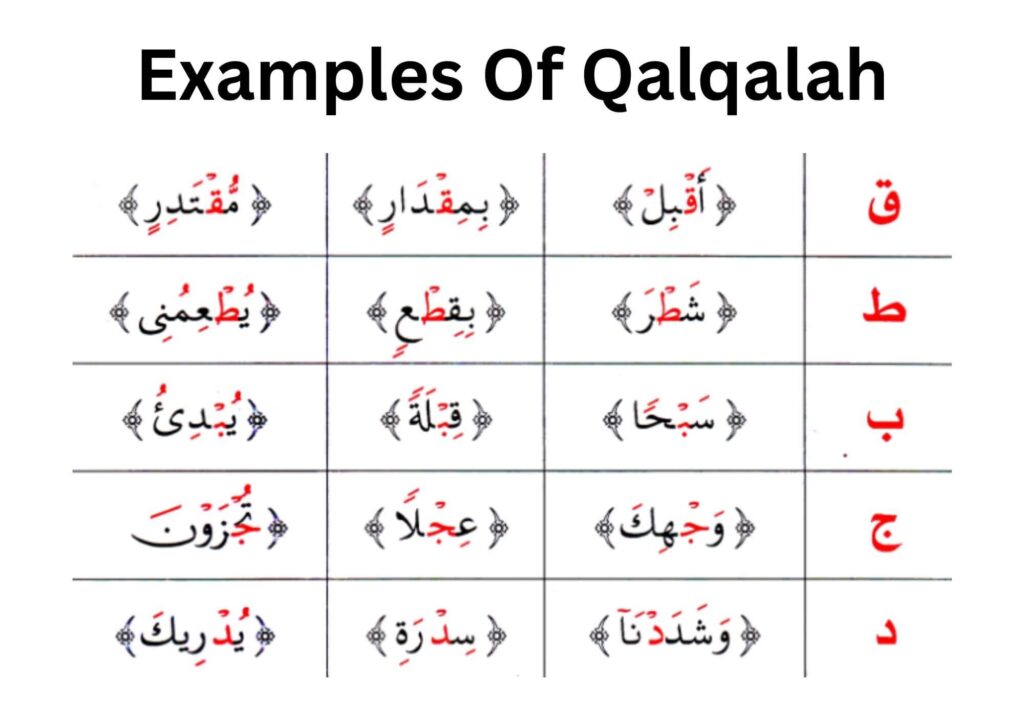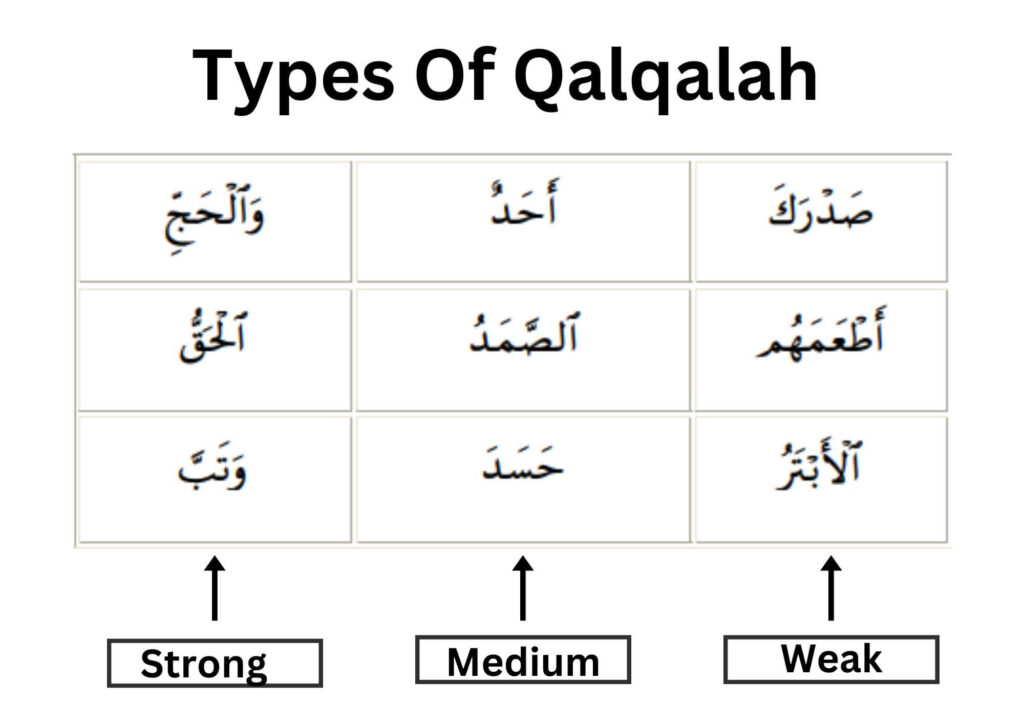Qalqalah in Tajweed
Understanding Echoing Sounds in Quranic Recitation
The beauty of Quranic recitation lies in the precision with which its rules are applied. One such important aspect of Tajweed is Qalqalah, a rule that enhances the sound and meaning of specific Arabic letters. This article dives deep into understanding Qalqalah, its significance, and how to apply it, ensuring you master this rule in your Quranic recitation.
What is Qalqalah?
Qalqalah means vibration, it is the vibration of sound at the end of the
pronunciation of specific letters, known as Huruf al-Qalqalah, if they have a Sukoon sign at the top of it. This sound occurs whether the letter appears in the middle or at the end of a word, making the Quranic recitation more clear and distinct.
The Letters of Qalqalah:
There are five letters that fall under the category of Huruf al-Qalqalah. These letters can be easily remembered through the phrase قُطْبُ جَدٍ (Qutb Jad), which consists of:
- ق (Qaaf)
- ط (Taa)
- ب (Baa)
- ج (Jeem)
- د (Daal)
When any of these letters appear with a Sukoon, they will be pronounced with a distinct echo.
Types of Qalqalah:
Qalqalah has been categorized into three levels based on the strength and placement of the echo sound:
1) Qalqalah Sugra (Weak Qalqalah)
2) Qalqalah Wusta (Medium Qalqalah)
3) Qalqalah Kubra (Strong Qalqalah)
1. Qalqalah Sugra (Weak Qalqalah):
This occurs when the Qalqalah letter appears in the middle of a word. In this instance, the echoing sound is lighter compared to other forms, but it’s still present.
Example:
- In the word أَجْرٍ (Ajr), the letter “ج” carries a light echo.
2. Qalqalah Wusta (Medium Qalqalah):
This form takes place when a Qalqalah letter appears at the end of a word without a Shaddah (double letter). The echo is more noticeable compared to the Sugra form.
Example:
- In مَسَدٍ (Masad), the final “د” echoes with a medium bounce.
3. Qalqalah Kubra (Strong Qalqalah):
The strongest Qalqalah occurs when the letter has a Shaddah at the end of a word and the reciter stops on it. The echo becomes more forceful, leaving a lasting impact.
Example:
- In the phrase وَتَبَّ (Wa Tabb), the final “ب” has a strong echo due to the Shaddah.
Rules for Applying Qalqalah:
To apply Qalqalah correctly, one must keep these rules in mind:
- Sukoon: The letter must be static (Sakin) and void of any movement or vowel, such as Fatha, Kasra, or Dummah.
- Stopping (Waqf): When stopping on a word that ends with a Qalqalah letter, ensure the sound echoes appropriately according to its type.
If the letter has a vowel, no Qalqalah is applied, and the letter is pronounced normally.
Common Mistakes in Qalqalah:
Many beginners struggle with Qalqalah, often making these errors:
- Echoing Non-Qalqalah Letters: Some learners mistakenly echo letters that are not part of the Qalqalah group. For instance, echoing a letter like Laam (ل) is incorrect.
- Over-exaggeration or Under-emphasis: While Qalqalah should produce a noticeable echo, it should not be exaggerated. Similarly, underplaying the sound can lead to improper recitation. The goal is to maintain a balance based on the level of Qalqalah being applied.
Benefits of Learning Qalqalah:
Mastering Qalqalah is crucial for proper recitation of the Quran. It not only beautifies the recitation but also ensures the integrity of the words, preventing any mispronunciation that could alter the meaning.
By applying Qalqalah, you enhance your Tajweed skills, making the recitation clearer and more melodious, while adhering to the precise linguistic rules set forth in the Quranic script.
Practical Examples from the Quran:
Let’s explore a few verses where Qalqalah letters appear, showcasing each type of Qalqalah.
- Qalqalah Sugra (Weak):
- وَلَا تُجْزَوْنَ إِلَّا مَا كُنتُمْ تَعْمَلُونَ
(Surah Ya-Sin: 54)- The letter “ج” in تُجْ carries a light echo.
- وَلَا تُجْزَوْنَ إِلَّا مَا كُنتُمْ تَعْمَلُونَ
- Qalqalah Wusta (Medium):
- مَآ أَغْنَىٰ عَنْهُ مَالُهُۥ وَمَا كَسَبَ
(Surah Al-Masad: 2)- The letter “ب” in كَسَبَ is echoed with a medium sound.
- مَآ أَغْنَىٰ عَنْهُ مَالُهُۥ وَمَا كَسَبَ
- Qalqalah Kubra (Strong):
- تَبَّتْ يَدَآ أَبِى لَهَبٍۢ وَتَبَّ
(Surah Al-Masad: 1)- The letter “ب” in وَتَبَّ creates a strong echo.
- تَبَّتْ يَدَآ أَبِى لَهَبٍۢ وَتَبَّ
Avoiding Mistakes in Recitation:
To avoid mistakes in applying Qalqalah, it’s essential to practice with a qualified teacher who can provide feedback and guide you through proper pronunciation. Additionally, consistent recitation with focus on Tajweed principles will improve your accuracy over time.
Learn More About Tajweed with Us!
At Virtual Quran Institute, we offer comprehensive Tajweed courses taught by expert teachers. Our lessons cover all the essential rules, including Qalqalah, to help you perfect your Quran recitation. Whether you’re a beginner or an advanced student, our courses are tailored to meet your individual needs.
Conclusion:
Mastering Qalqalah is an integral part of Tajweed that enhances the clarity and beauty of Quranic recitation. By understanding the different levels of Qalqalah and practicing it diligently, you can recite the Quran with greater precision and devotion. If you’re eager to deepen your knowledge and skill in Quranic recitation, join us at the Virtual Quran Institute for personalized Tajweed lessons. Enroll today and perfect your recitation with expert guidance!




